人教版新目标七年级下Unit11 Section A1课件(57页)
合集下载
人教新版七年级下Unit11 Section A 1a-1c课件(共29张PPT)
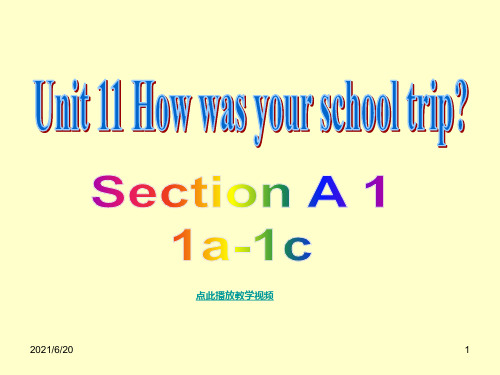
点此播放教学视频
2021/6/20
1
Practice
A: What does he /she often do on weekends?
do they
B: He/ She often…
They
do his homework
does
play football
plays
go shopping
watch TV
2021/6/20
7
三、一般过去时的判断标志词
一般过去时的判断标志词 yesterday , yesterday morning, the day before yesterday , last + 时间 , this morning, 时间 + ago , just now , a moment ago , in + 过去的时间 , 等。 注意:一般过去时表示过去经常或反复发生的动作, 也常和often经常,always总是,once a week一周一次, 等表示频度的时间状语连用。
2021/6/20
10
Look at the picture. This is a farm. Last week Carol and his classmates had a school trip. They went to the farm. What did they do on the farm? Let’s go and have a look.
口诀:一加ed,二加d,三要双写,
四注意,y变成ied,特殊形式特殊记。
2021/6/20
9
五、 一般过去时的基本用法
① 表示过去某个时间发生的动作或存在的状态。 My father _w_o__rk_e_d_in Shanghai last year. 我爸爸去年在上海工作。
2021/6/20
1
Practice
A: What does he /she often do on weekends?
do they
B: He/ She often…
They
do his homework
does
play football
plays
go shopping
watch TV
2021/6/20
7
三、一般过去时的判断标志词
一般过去时的判断标志词 yesterday , yesterday morning, the day before yesterday , last + 时间 , this morning, 时间 + ago , just now , a moment ago , in + 过去的时间 , 等。 注意:一般过去时表示过去经常或反复发生的动作, 也常和often经常,always总是,once a week一周一次, 等表示频度的时间状语连用。
2021/6/20
10
Look at the picture. This is a farm. Last week Carol and his classmates had a school trip. They went to the farm. What did they do on the farm? Let’s go and have a look.
口诀:一加ed,二加d,三要双写,
四注意,y变成ied,特殊形式特殊记。
2021/6/20
9
五、 一般过去时的基本用法
① 表示过去某个时间发生的动作或存在的状态。 My father _w_o__rk_e_d_in Shanghai last year. 我爸爸去年在上海工作。
人教版英语七年级下unit11-sectionAPPT课件

with her cell phone.
28
3. It was so much fun.
fun表示“有趣的事情”,为不可数名词。 e.g. Look, Peter. The children are having
so much fun. 4. Lucky you! 你真幸运! 这是一句非正式口语,相当于You’re so lucky. Lucky之后的人称还可以改为me, him。
8
Did he ride a horse? No, he didn’t. Did he feed chickens? Yes, he did. He fed chickens.
Did he go to the zoo? No, he didn’t. He went to a farm. Did he see any cows? Yes, he did. He saw quite a lot.
音后面
/d/
moved /mu:vd/
在清辅音后面 /t/
passed /pa:st/
在t, d 后面 / it / needed /'ni:did/ /id/
清念 /t/, 元浊/d/; /t/ /d/ 之后念/id1/6
一般过去时
知识结构
构成 一般过去时 用法
常用时间
动词的过去式
1. 表示过去某个时间发 生的动作或存在的状态。 2. 表示过去经常或 反复发生的动作。
did his homework took some photos
played football. picked strawberries
rode a horse. watched TV.
talked with a farmer fed chickens
28
3. It was so much fun.
fun表示“有趣的事情”,为不可数名词。 e.g. Look, Peter. The children are having
so much fun. 4. Lucky you! 你真幸运! 这是一句非正式口语,相当于You’re so lucky. Lucky之后的人称还可以改为me, him。
8
Did he ride a horse? No, he didn’t. Did he feed chickens? Yes, he did. He fed chickens.
Did he go to the zoo? No, he didn’t. He went to a farm. Did he see any cows? Yes, he did. He saw quite a lot.
音后面
/d/
moved /mu:vd/
在清辅音后面 /t/
passed /pa:st/
在t, d 后面 / it / needed /'ni:did/ /id/
清念 /t/, 元浊/d/; /t/ /d/ 之后念/id1/6
一般过去时
知识结构
构成 一般过去时 用法
常用时间
动词的过去式
1. 表示过去某个时间发 生的动作或存在的状态。 2. 表示过去经常或 反复发生的动作。
did his homework took some photos
played football. picked strawberries
rode a horse. watched TV.
talked with a farmer fed chickens
人教新目标七年级英语下册课件Unit 11 Section A 2a-2d课件

一、用所给词的适当形式填空。(5×4分=20分) 1.Did you pick (pick) any strawberries yesterday? 2.He learned a lot about farming(farm). 3.He can't see anything new (something new)in the newspaper. 4.They went fishing (fish) last week. 5.—How was (be) your weekend? —It was great.
• 9.We often A soccer on Sunday afternoon,but last Sunday afternoon we ________ pingpong.
• A.play,played B.played,play • C.play,play D.played,played • 10.—Did you see any apples? • —D.We only saw some strawberries. • A.Yes,we did B.Yes,we do • C.No,we don't D.No,we didn't
• 四、根据汉语意思完成句子。(5×6分=30分) • 16.杰克的叔叔是一位农民,他在农场工作。 • Jack's uncle is a farmer.He works on a farm. • 17.让我带你参观一下我们的学校吧! • Let me show you around our school! • 18.农村的空气非常干净。 • The air in the countryside is very clean.
• 二、单项选择。(5×5分=25分) • 6.I called you,but nobody answered.Where D you? • A.is B.are C.was D.were • 7.What C your sister do on her last school trip? • A.does B.do C.did D.was • 8.John,your shoes are not A,you have to ________ them. • A.clean,clean B.cleaned,cleaned • C.clean,cleaned D.cleans,cleaning
新目标英语七年级下册Unit 11 Section A-1课件(新人教版 )

1a. Match the phrases with the pictures.
1. went for a walk ____ e 2. milked a cow ____ b 3. rode a horse ____ 4. fed chickens ____ a c 5. talked with a farmer ____ f 6. took some photos ____ d
Unit 11 How was your school trip?
What did you do on your last school trip?
went to the beachwent to the zoo went to the aquarium (go)
saw some seals (see)
What did you do last month?
I went _ the countryside?
It was beautiful. ____ you go to the zoo? Did
No, I didn’t.
What ___ did they do 3 days ago? They __________ had a party with their friends. How was ___ their party? It was exciting.
Did they pick any strawberries on the farm? Yes, they did. How were the strawberries? They were delicious. Were the strawberries good? Yes, they were. No, they weren’t.
人教新目标七年级下Unit11,SectionA1课件

选择填空 1. __B__ Emily at her aunt’s last night?
A. Is B. Was C. Did
2. __C___ he sleep late last night? A. Is B. Was C. Did
3. My mother ____C___ some cakes for us last night.
例:He went for a walk yesterday. (否定句):He didn’t go for a walk. (疑问句): Did he go for a walk?
(肯定回答):Yes, he did. (否定回答): No, he didn’t.
3.一般过去时的特殊疑问句式:
特殊疑问词+ 一般疑问句? 1)特殊疑问词+was/were+主语+其他?
sheep
farmer 农民
farm 种田 grow 种植
feed 喂养
milk 挤奶 pick 采摘
go for a walk
散步
milk a cow
给奶牛挤奶
ride a horse
骑马
feed chickens
喂鸡
talk with a farmer take some photos
和农民交谈
A. makes B. make C. made
4. — Did they take any photos? — ____A___. A. No, they didn’t B. No, they did C. No, they aren’t
规则动词过去式的构成
构成规则
原形 过 去 式
work 一般在动词原形末尾加-ed
人教新目标七年级下Unit11 Section A 1 1a-2d 课件共17张PPT
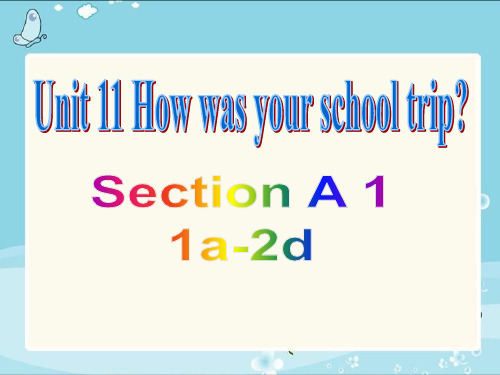
countryside. Peter: Oh, nice. What did you do? Eric: I went fishing every day. And I fed the chickens with
my grandpa. It was so much fun. Peter: Sounds good. How was the weather there? Eric: It was great, and the air was so
3 The farmers grow strawberries from December
to June. T F
4 The farmers don’t grow apples. T F
5 Carol picked some strawberries
and took them home.
TF
Did Carol learn a lot about farming?
√B. in the countryside What did Eric do? He went fishing. What did he do?
√√
√ √
Peter: Hi, Eric. How was your trip last week? Eric: It was excellent. I visited my grandparents in the
1. Did you see any cows? Yes, I did. I saw quite a lot.
quiet a lot 相当多+of+可数或不可数, 也可 以单独使用。 quite a little 相当多+不可数名词 quite a few 相当多+可数名词
my grandpa. It was so much fun. Peter: Sounds good. How was the weather there? Eric: It was great, and the air was so
3 The farmers grow strawberries from December
to June. T F
4 The farmers don’t grow apples. T F
5 Carol picked some strawberries
and took them home.
TF
Did Carol learn a lot about farming?
√B. in the countryside What did Eric do? He went fishing. What did he do?
√√
√ √
Peter: Hi, Eric. How was your trip last week? Eric: It was excellent. I visited my grandparents in the
1. Did you see any cows? Yes, I did. I saw quite a lot.
quiet a lot 相当多+of+可数或不可数, 也可 以单独使用。 quite a little 相当多+不可数名词 quite a few 相当多+可数名词
人教版新目标七年级下册 Unit 11SectionA Grammar一等奖优秀课件
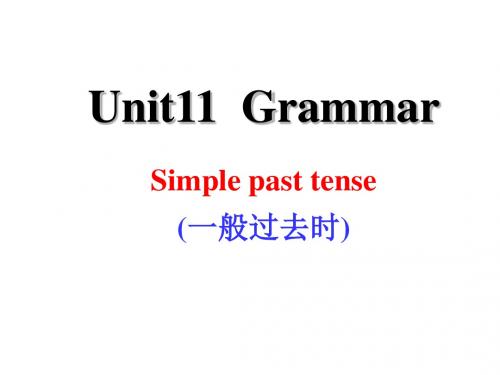
bank hospital last year now
Is there a bank now? Yes, there is.
What do you often do on weekends? play basketball dance
study English shop in the supermarket
visit ed /’vIzIt I / d/
finished /t/ enjoyed /d/ shouted /Id/ moved /d/ helped wanted called needed /t/ /Id/ /d/ /Id/
写出下列动词的过去式
1. look
2. live
3. stop 4. go
主语 + be(was/were)+ ……. 主语 + be(was/were)+ not ……. Be (Was/Were)+主语 + ……?
疑问词+was/were+主语+……?
He was busy yesterday. He was not busy yesterday. Was he busy yesterday? Yes, he was./ No, he wasn’t. When was he busy?
3.末尾只有一个辅音字母的重读闭音 节词,先双写这个辅音字母,再加ed . stop — stopped shop — shopped
4.以辅音字母加y结尾的词,先改 y为i, 再加ed study — studied
worry-- worried carry-- carried
5.不规则变化.(见不规则动词表P141)
人教新目标英语七年级下册 Unit 11 Section A(1a---2d)课件
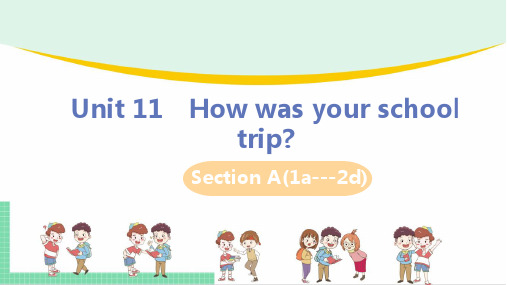
新课讲解
go 的过去式 went to the beach
A: What did you do last weekend? B: I went to the beach.
新课讲解
went to the movies
A: What did you do last weekend? B: I went to the movies.
___ What did the farmer say?
_√__ What did you see?
___ Did you learn anything?
_√__ Did you ask him any questions?
___ Did you grow any apples?
_√__ Do they grow apples?
新课讲解
1c Ask and answer questions about Carol’ s school trip. A: Did Carol take any photos?
B: Yes, she did.
新课讲解
2a Listen and check (√) the questions you hear.
新课讲解
A: What did you do last weekend? B: I played basketball.
played basketball
新课讲解
A: What did you do last weekend? B: I went for a walk.
went for a walk
②What club does Jane join? 4. want to do sth.
课后作业
人教版英语七年级下册《Unit 11 Section A 1a-1c》教学课件
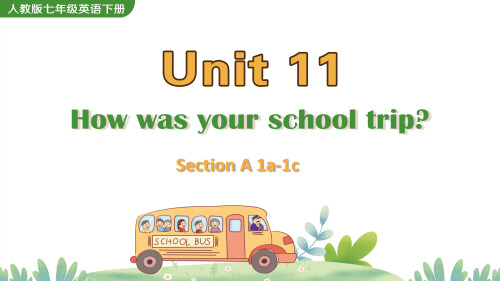
(作否定回答)
--______,N__o_____ t_h_e__r_e__nwoabosdy.
8. ----Y_e_s_._T_h_eW(ybee_)r_et_h_e_y_a(thwavoer)kathmiseemtionrgning?
together.
had
9. --______ JDoeid______ (do) well in the long-distance running?
take与photo, picture等词搭配时,表示 “拍摄,摄影”。表示“拍摄某物或人”, 就要在短语后面接介词“of” 引入所拍摄 的对象。
e.g. The girl likes to take photos of herself with her cell phone.
Exercises
Ⅰ.填入适当的词。 1. She often _g_o_e_s_ (go) to the park on weekends, but yesterday she w__e_n_t(go) to the zoo. 2. Last week, she _h_a_d__ (have) fun on a farm.
talked with a farmer
1c
Ask and answer questions about Carol’s school trip.
A: Did Carol take any photos?
B: Yes, she did.
Language points
1. -Did you see any cows? -Yes, I did. I saw quite a lot. quiet a lot 相当多+of+可数或不可数,也可以 单独使用。 quite a little 相当多+不可数名词 quite a few 相当多+可数名词
新目标(人教)七年级下册英语教学课件 Unit 11 Section A(GF-3b)

live → lived like → liked
study → studied carry → carried
stop → stopped plan → planned
【特别提醒】 (1) 在清辅音后,-ed 读/t/。如walked /wɔːkt/, stopped /stɒpt/。 (2) 在元音或浊辅音后,-ed读/d/。如lived /livd/,enjoyed /ɪnˈdʒɔɪd/。 (3) 在/t/和/d/后,-ed读/id/。 如studied /stʌdid/.
/sʌn/n.太阳
Read the letters carefully and answer the questions. (1) Who wrote the first letter?
It was a letter from Jim./Jim did. (2) Why did he write the letter?
Regular verbs
play→played visit→visited climb→climbed study→studied worry→worried stop→stopped
Irregular verbs
do→did is→was are→were have→had eat→ate buy→bought
省略了that的宾语从句
it got very cloudy and we worried it would rain. and连接两个并列分句
worry v.&n. 担心;担忧
【用法详解】 (1) worry在句中作动词,后面可接宾语从句。 ➢ Her parents worry (that) she may be late for school. 她的父
相关主题
- 1、下载文档前请自行甄别文档内容的完整性,平台不提供额外的编辑、内容补充、找答案等附加服务。
- 2、"仅部分预览"的文档,不可在线预览部分如存在完整性等问题,可反馈申请退款(可完整预览的文档不适用该条件!)。
- 3、如文档侵犯您的权益,请联系客服反馈,我们会尽快为您处理(人工客服工作时间:9:00-18:30)。
A: What does he /she often do on weekends? do they B: He/ She often… They do his homework
does play football
Practice
plays
go shopping
watch TV
What do you do every day?
What did you do last weekend?
played basketball
play basketball
play the guitar
played the guitar
play computer
played computer
What did you/he/she/they/Mr. Green do last weekend?
had / ate ice cream (have/ eat)
went out with friends (go)
bought a gift (buy)
visited Visitors’ Center (visit)
What did you do on your last school trip?
A: Where did he go last Sunday?
B: He stayed at home.
A: Where did they go last Sunday? B: They went to a farm.
一般过去时
一、 一般过去时的概念
一般过去时用来表示过去某一时间内发生的动作或存在的 状态以及过去习惯性、反复性的动作;过去主语所具备的 能力和性格。谓语动词要用动词的过去式(v-ed), 基本结构:主语+动词过去式+其他; 常和表示过去的时间状语连用, 如yesterday昨天、last night昨晚、last week上周、 last year去年,等。
口诀:一加ed,二加d,三要双写, 四注意,y变成ied,特殊形式特殊记。
2.不规则动词的过去式需特殊记忆。 was am(is) are(是) could do/does(做,干) can(能) had have (has)(有) go(走) came feed (喂) come(来) bought eat(吃) buy (买) grow(生长) grew ride (骑) ran run(跑) say (说) saw see (看见) get(变得,到达) taught take(带) teach(教) swim(游泳) swam learn(学习)
3. 情态动词的一般过去时态 肯定句式:主语 + 情态动词的过去式 +v原型+ 其它. 否定句式:主语 + 情态动词的过去式 + not +v原型 + 其它. 一般疑问句:情态动词的过去式 + 主语 + v原型+ 其它? could , may→______, might 注:情态动词的过去式:can→_____ would ,shall-______ must ,will-______ should must→_____ 。 4.特殊疑问句式:特殊疑问词+ 一般疑问句? 1)特殊疑问词+was/were+主语+其他? 2)特殊疑问词+情态助动词过去式+主语+v.原形+其他? 3)特殊疑问词+did+主语+v.原形+其他? 1)Why ____ was ____he late for school last Monday? 他上周一为什么上学迟到了? do 2)What _____ could ______she ____twenty years ago? 20年前她能做什么? Where did go yesterday?昨天你去哪了? 3) _____ _____you_____
五、 一般过去时的基本用法
① 表示过去某个时间发生的动作或存在的状态。 worked Shanghai last year. My father _______in 我爸爸去年在上海工作。 ②表示过去的习惯性或经常发生的动作,常和often经常, always总是,once a week一周一次,等表示频度的时间 状语连用。 to school I often went _____________on foot.(过去)我经常步行去上学。 ③与when等连词引导的 状语从句连用。 had short rest. When she got home,she _____a 当她到家时,她稍微休息了一下。
were did went fed ate rode said got took learned learnt
写出下列动词的过去式, 找出规则动词过 去式的构成。
不规则动词 go went ride rode do did is was are were have had eat ate buy bought see saw 规则动词 pick picked visit visited watch watched climb climbed study studied worry worried play played live lived stop stopped
had (have) a good time yesterday. 1. They ______ watch (not watch) TV last night. 2. They didn’t ___________ Did you _____ go (go) to the park yesterday? 3. ____ did / _____, No I didn’t. Yes, I____. 注意:1. did和didn’t 是构成一般过去时的助动词, 其特点是要在其后跟动词的原形。 2. 实意动词do的一般过去时 I do my homework every day.(用yesterday改写句子) did I ____my homework yesterday. didn’t do my homework yesterday.(否定句) I _________ do your homework yesterday? ____ you ____ Did Yes ,I did. /No, I didn’t.(一般疑问句)
have a pizza ( had)
take photos ( took) go swimming (went)
A: Where did you go last Sunday?
B: I went to Beijing City.
A: Where did she go last Sunday?
B: She went to the beach.
Unit 11 How was your school trip?
Section A 1 1a— 2d
every day yesterday
• I geLeabharlann home at 5:00 every day.
I got home at 5:00 yesterday.
• Jack sees a movie every day.
went to the beach (go) went to the zoo
saw some pandas (see) took photos (take)
A: Did you +V. …….?
buy a gift (bought)
B: Yes, I did. I V.-ed ……. (No, I didn’t.. I didn’t +V.….
三、一般过去时的判断标志词
一般过去时的判断标志词 yesterday , yesterday morning, the day before yesterday , last + 时间 , this morning, 时间 + ago , just now , a moment ago , in + 过去的时间 , 等。 注意:一般过去时表示过去经常或反复发生的动作, 也常和often经常,always总是,once a week一周一次, 等表示频度的时间状语连用。
studied for the test
watched TV
did some reading
had a party
played tennis
went to the beach
went to the mountains
What did you do last weekend?
watch ed TV
listen ed to music
二、一般过去时的结构(可分三类不同的结构)
are---were 1. Be动词的一般过去时 am/is ---was wasn’t 肯定句式:主语 + was / were + 其它. 否定句式:主语 + wasn’t /weren’t+ 其它. =was not 一般疑问句:Was/Were + 主语 + 其它? weren’t =were not 肯定回答:Yes,主语+ was / were . 否定回答:No,主语+ wasn’t /weren’t. There be There was/were+某人、某物+某地、某时 表示在过去的某地某时有某人某物的存在 2. 行为动词(v.)的一般过去时态 【did not = didn’t】 肯定句式:主语 + v-ed+ 其它. 【do , does 否定句式:主语 + didn’t + v原形+ 其它. ---did】 一般疑问句:Did + 主语+ v.原形+ 其它? 肯定回答:Yes,主语+did. 否定回答:No,主语+did’t.
